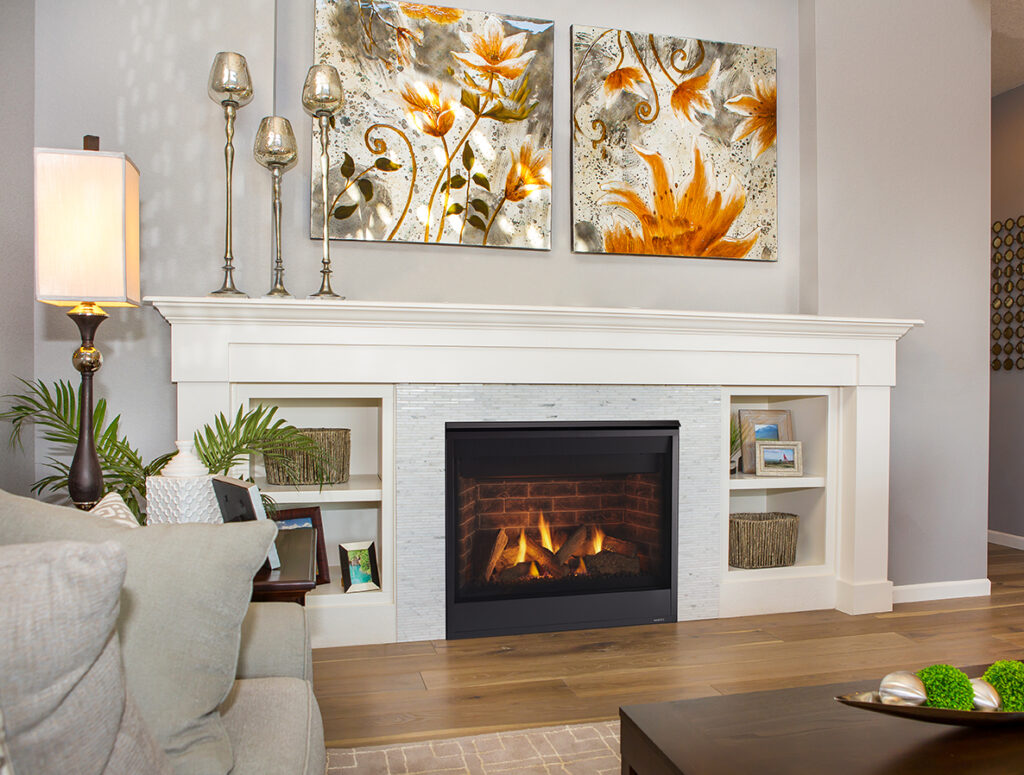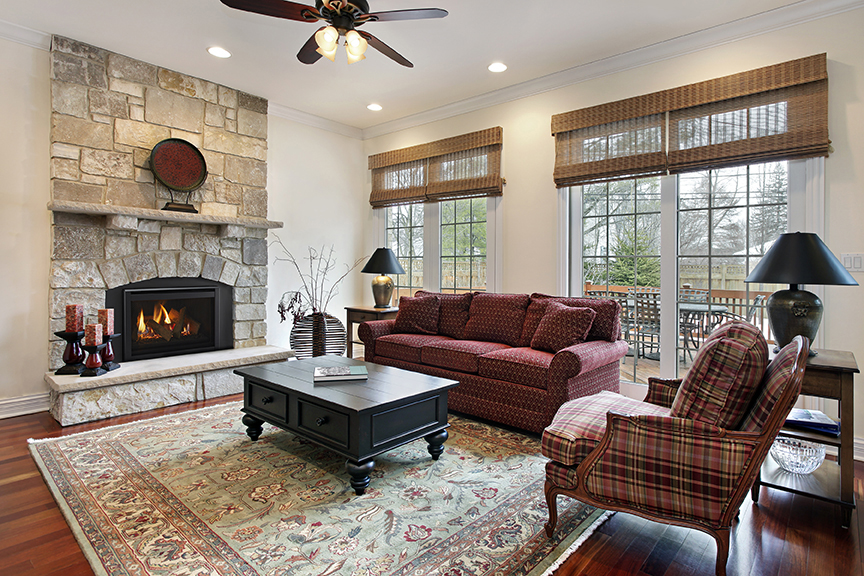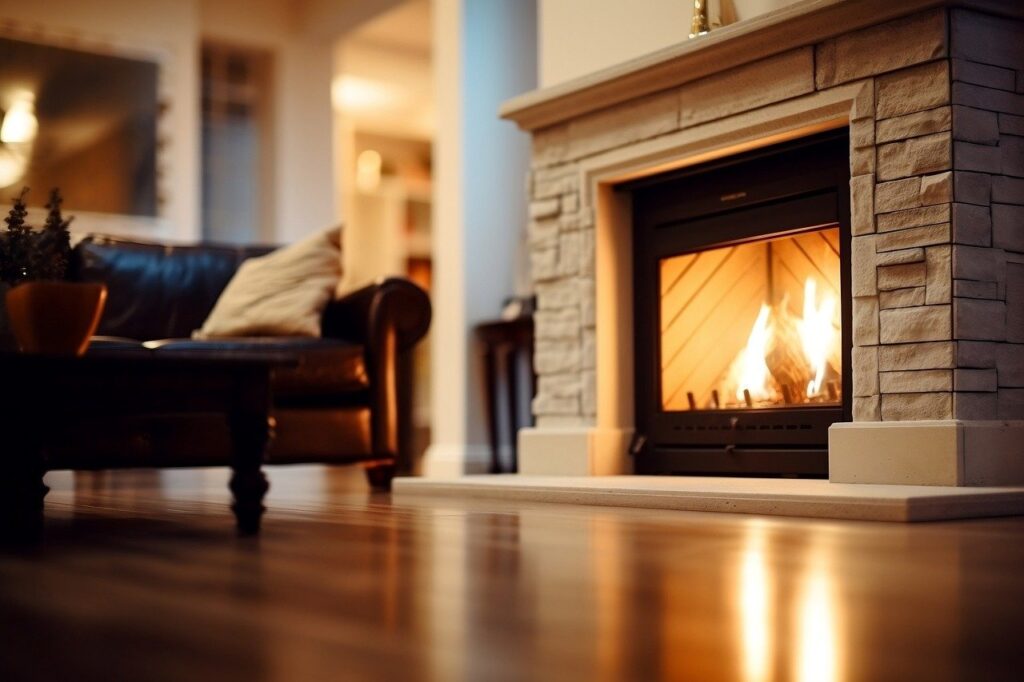
Should you buy a gas fireplace? Yes! Among other benefits, they’re clean, convenient, and they look great. And who doesn’t love the cozy environment that a gas fireplace provides?
In this article we will examine the pros and cons of a gas fireplace, helping you to make your own informed decision. We will then examine what is required for both pre-installation and installation.
Click on each corresponding link to jump ahead:
If you are looking to have a new gas fireplace installed, or have your existing fireplace serviced, contact your local Cambridge HVAC technicians at Service 1st Heating and Cooling. When you choose Service 1st, you will receive our professional support and expertise for the entire life of your product.
Should You Buy a Gas Fireplace?
1. The Pros of a Gas Fireplace

Not only are gas fireplaces cleaner than traditional wood burning ones, but they are also more energy efficient.
Each homeowner might choose to buy a gas fireplace for different reasons depending on their specific needs and preferences. For example, perhaps you simply enjoy the ambiance of a fireplace, or you have a cold basement and you want to snuggle up by the fire during your weekly sports games. Whatever the case, there are several reasons why you may choose to have a gas fireplace installed in your home.
Gas fireplaces, including gas stove fireplaces, gas insert fireplaces, and direct vent fireplaces, offer several advantages that make them appealing for homeowners. For a more detailed explanation of these three types of gas fireplaces, check out our most recent blog post “Guide to Fireplace Maintenance”.
Here are some key reasons why a homeowner might opt for a gas fireplace:
- A) Convenience: Gas fireplaces are highly convenient, offering easy ignition and control. With just the flip of a switch or the press of a button, a gas fireplace can provide instant warmth and ambiance, without the need to gather or chop wood, as required with traditional wood-burning fireplaces.
- B) Cleanliness: Gas fireplaces produce minimal mess and require little maintenance compared to wood-burning fireplaces. Homeowners can avoid dealing with soot, ash, and creosote buildup that typically come with wood-burning fireplaces.
- C) Energy Efficiency: Gas fireplaces are generally more energy-efficient than traditional wood-burning fireplaces. They can be a cost-effective heating option, as they waste less energy and are designed to provide consistent and controllable heat, which can help reduce overall heating costs.
- D) Safety: Gas fireplaces are considered safer than wood-burning fireplaces because they eliminate the risks associated with sparks, flying embers, and the potential buildup of creosote in the chimney. They also do not require ventilation for the smoke produced, reducing the risk of indoor air pollution.
- E) Aesthetics: Gas fireplaces come in a variety of designs and styles, allowing homeowners to choose a model that complements their interior decor and personal preferences. They can provide the cozy and inviting atmosphere of a traditional fireplace without the hassle of maintaining a wood-burning one.
- F) Flexibility: Gas fireplaces, including gas insert and direct vent options, can be installed in various locations within a home, including existing fireplaces, walls, or other areas where traditional wood-burning fireplaces might not be feasible. This flexibility makes them a practical choice for homeowners looking to add a fireplace to their living space.
Overall, the decision to purchase a gas fireplace, whether it’s a gas stove fireplace, a gas insert fireplace, or a direct vent fireplace, often comes down to each homeowner’s particular lifestyle, heating needs, aesthetic preferences, and the practicality of installation within their home.
If you have any questions regarding the practicality of a gas stove fireplace in your home, give us a call or contact us directly.
2. The Cons of a Gas Fireplace

Before purchasing a gas fireplace, consider the initial cost and any environmental concerns.
While gas fireplaces offer several advantages, we also want to make you aware of some factors you should consider prior to making a purchase decision.
Here are some common drawbacks associated with gas fireplaces, including gas stove fireplaces, gas insert fireplaces, and direct vent fireplaces:
- A) Dependency on Gas Supply: Gas fireplaces require a steady supply of natural gas or propane to operate. Homeowners need to consider the availability and cost of these fuel sources, which can be subject to fluctuations in market prices.
- B) Initial Cost: Gas fireplaces often require a significant upfront investment, including the cost of the unit itself, installation expenses, and any necessary venting or chimney modifications. This initial cost can be higher compared to some other heating options, such as electric fireplaces or traditional wood-burning fireplaces.
- C) Maintenance: Gas fireplaces still require regular maintenance to ensure proper functioning. This may involve cleaning the glass, checking for gas leaks, and servicing the unit to prevent any potential issues. Neglecting maintenance can lead to operational problems or reduced efficiency over time.
- D) Environmental Concerns: While gas is generally considered a cleaner fuel compared to wood in terms of emissions, it still contributes to carbon dioxide and other greenhouse gas emissions when burned. For environmentally conscious homeowners, the environmental impact of using natural gas or propane should be a consideration when opting for a gas fireplace.
- E) Dependency on Electricity: Some gas fireplaces, especially those with electronic ignition systems, may rely on electricity to function. In the event of a power outage, these fireplaces may not operate, leaving homeowners without a source of heat during critical times.
- F) Restricted Atmosphere: While gas fireplaces can mimic the appearance of a traditional wood-burning fireplace to some extent, some people may argue that they lack the authentic ambiance and crackling sounds of a real wood fire. For those seeking a more rustic or traditional fireplace experience, a gas fireplace might not fully satisfy their aesthetic preferences.
As a homeowner, you should weigh out these pros and cons and carefully determine whether a gas fireplace aligns with your heating needs, lifestyle, budget, and environmental considerations.
3. Preparation and Installation

Now that you understand the pros and cons, let’s examine pre and post-installation.
If you have made up your mind that you want to have a gas fireplace installed, these are are some things you should consider to prepare for installation:
- A) Research and Planning: Understand the specific type of gas fireplace you want to install and research local building codes, regulations, and permit requirements. Plan the location of the fireplace within your home and ensure it complies with safety standards and guidelines. Working with a trustworthy HVAC company that understands all legal requirements is your best bet.
- B) Budgeting: Estimate the total cost of the gas fireplace unit, installation, venting, and any necessary modifications to your home’s structure. Consider consulting with a professional to get an accurate assessment of the overall expenses.
- C) Hiring a Professional: Unless you have experience with gas appliance installation, it’s crucial to hire a qualified and certified professional to install the gas fireplace. Look for reputable contractors or technicians with experience in installing gas fireplaces and check their credentials, licenses, and customer reviews.
- D) Pre-Installation Inspection: Do your HVAC company a favour and ensure the designated installation area is clear of any objects that may restrict them from doing their job. and meets the requirements specified by the manufacturer and local building codes. The technician will then make any necessary structural modifications, such as adding support for the fireplace unit and creating proper ventilation or gas supply lines.
- E) Gas Line Installation: If there isn’t an existing gas line in the installation area, a gas line will need to be installed. The gas line must comply with safety standards and building codes to ensure the safe operation of the fireplace.
- F) Ventilation: Depending on the type of gas fireplace, a venting system may need to be installed. Direct vent gas fireplaces require a vent pipe to expel combustion byproducts outside, while vent-free models release exhaust directly into the room. Consult with a professional HVAC company to learn more.
- G) Final Installation: Once the gas line and ventilation system are in place, the installer will set up the gas fireplace unit itself. This process involves securing the fireplace in the designated location, connecting it to the gas line, and ensuring that all components are properly attached and sealed.
- H) Post Installation: After the installation, the technician will perform safety checks, including testing the gas connections, checking for leaks, and ensuring that the fireplace functions correctly. They may also provide instructions on how to operate and maintain the gas fireplace.
By understanding these steps, you will not be faced with any surprises during the preparation and installation stages. By working with experienced professionals, you can rest assured that your gas fireplace will be safely installed in your home.
For Gas Fireplace Installation and Maintenance - Trust Service 1st


If you are exploring different types of fireplaces and fireplace maintenance, contact us directly. You can rely on our experience and expertise at Service 1st. When it comes to gas fireplace installation and maintenance, we have you covered. We provide emergency services, maintenance plans, and more!
We have been serving homeowners in Cambridge and the surrounding areas for over 30 years and have a proven record of excellence. Whether it’s time for a simple service call or a furnace replacement, we can help.
We are a locally owned and operated business that prides itself on the highest quality work and installation of the highest quality products. We have received the prestigious Circle of Champions award from Bryant – an honour that highlights our commitment to quality, leadership, and excellence in the HVAC industry. We are an Elite Bryant Factory Authorized Dealer and offer our customers the highest quality products and services.
What Our Customers Are Saying...



“Fireplace yearly maintenance/tune-up. Corey was able to come earlier than scheduled. Fireplace was installed just over a year ago; looks brand new again. All technicians over the years have been on time, professional, efficient, knowledgeable (answer any and all questions) and friendly – almost like family, will continue to use Service 1st.”
Debbie, M.



